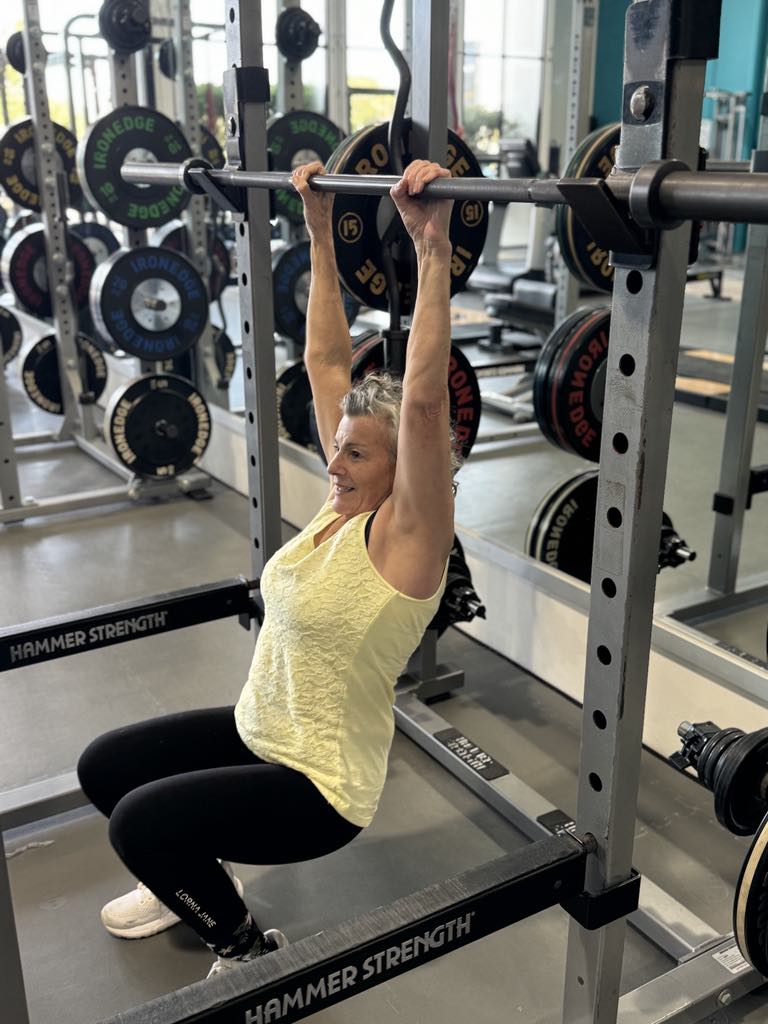Key Benefits of Resistance Training for Women in Perimenopause and Menopause:
- Maintains Muscle Mass and Strength: Resistance training helps counteract the natural decline in muscle mass associated with aging, known as sarcopenia.
- Improves Bone Density: Strength training supports bone health by slowing down or even reversing bone loss, reducing the risk of osteoporosis.
- Enhances Metabolism: Increased muscle mass from strength training helps boost metabolism, which can aid in weight management during menopause.
- Supports Mental Health: Exercise, particularly resistance training, has been linked to reduced anxiety and depression, both of which are common during menopause due to hormonal fluctuations.
- Improves Balance and Mobility: Resistance training enhances balance, coordination, and mobility, helping reduce the risk of falls and injuries as women age.
- Enhances Cardiovascular Health: While often associated with aerobic exercise, resistance training has been shown to benefit heart health by improving blood pressure and cholesterol levels.
- Reduces Symptoms of Menopause: Regular strength training can alleviate symptoms such as hot flashes, mood swings, and sleep disturbances by promoting overall health and hormonal balance.

Perimenopause and menopause represent a significant phase in a woman’s life, marked by various physiological changes driven primarily by fluctuating hormone levels. These changes often lead to an array of challenges, including muscle loss, weight gain, increased risk of osteoporosis, and mood changes. However, resistance training—also known as strength training—emerges as a powerful tool to mitigate many of these symptoms and improve overall quality of life during this transition. Resistance training involves the use of free weights, machines, or body weight to build muscle, increase strength, and promote overall well-being.
The Science Behind Resistance Training for Women in Perimenopause and Menopause
As women enter perimenopause, their estrogen levels begin to decline. Estrogen plays a crucial role in maintaining muscle mass, bone density, and metabolic rate. The decline in estrogen is one of the main reasons women in this phase of life experience muscle loss, weight gain, and an increased risk of osteoporosis.

Research highlights the significant benefits of resistance training during this period:
- According to a study published in Menopause Journal, women who engaged in regular resistance training showed a marked improvement in bone density and muscle mass compared to those who did not exercise.
- A study in the Journal of Strength and Conditioning Research found that menopausal women who participated in resistance training twice a week experienced improved muscle strength, reduced body fat, and increased bone mineral density.
- Another study published in The American Journal of Clinical Nutrition indicated that postmenopausal women who incorporated strength training into their routine showed improvements in metabolic rate, which can help combat the slower metabolism often experienced during menopause.
Resolute Resistance: Personalised and Safe Training for Women
At Resolute Resistance, we understand that every woman’s body is unique, especially during perimenopause and menopause, when physical changes can vary greatly. Our training sessions prioritise safety and proper form, ensuring that each participant learns to move correctly to avoid injury and maximise benefits. Whether you’re new to resistance training or experienced, we modify exercises to suit your individual needs and fitness level.
Our group training sessions are conducted in a personalised setting, providing the guidance and attention necessary for women in this phase of life. This supportive environment allows you to progress at your own pace while still benefiting from the motivation and camaraderie of group workouts. By focusing on safe movement patterns and customised modifications, we help women feel confident and empowered in their fitness journey.
How to Get Started with Resistance Training
For women entering or experiencing perimenopause and menopause, resistance training should be a key component of their fitness routine. However, starting gradually and progressing safely is essential. Here are some tips:
- Focus on Form: Proper form is crucial for preventing injury. At Resolute Resistance, we emphasise teaching correct movement patterns to ensure that participants train safely.
- Be Consistent: Aim to incorporate resistance training 2-3 times per week. Consistency is key to seeing improvements in strength, muscle mass, and overall health.
- Listen to Your Body: It’s important to challenge yourself, but also be mindful of any discomfort or pain. Rest and recovery are as important as the training itself, especially during menopause when joints and muscles may need extra care.
Resistance training is a powerful tool for women navigating the challenges of perimenopause and menopause. Not only does it help counteract the physical changes associated with aging, such as muscle loss and decreased bone density, but it also offers a host of mental and emotional benefits. At Resolute Resistance, we ensure that your training is safe, personalised, and effective, allowing you to embrace this life stage with strength and resilience.
Secure your free trial with us today:

